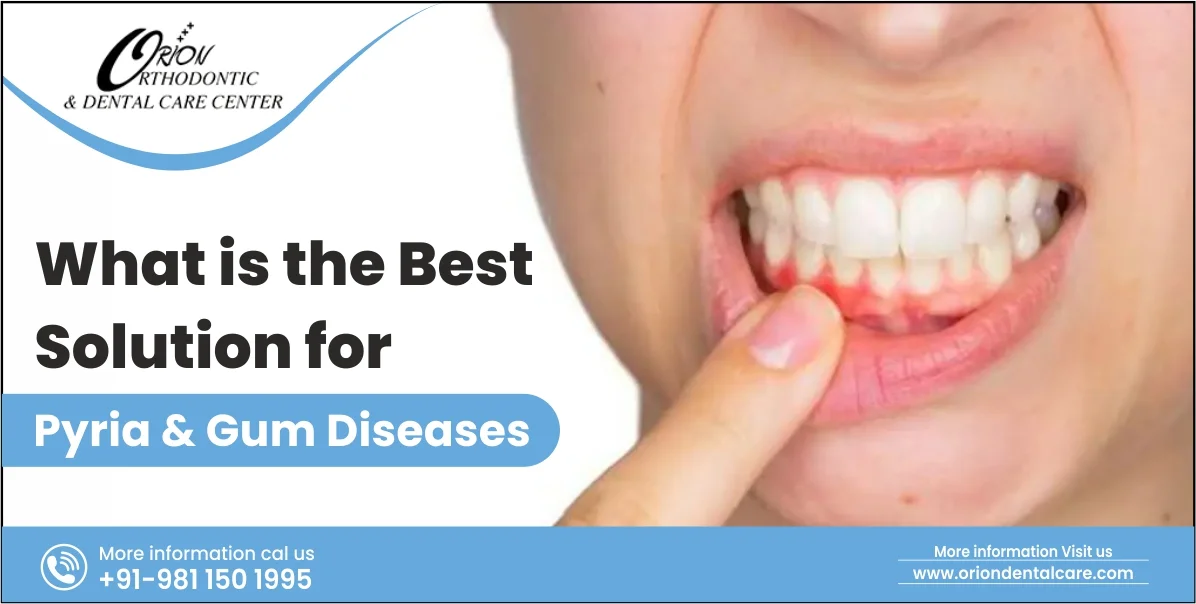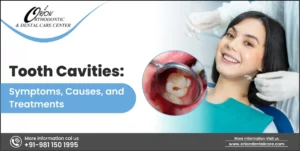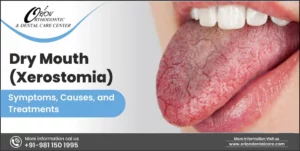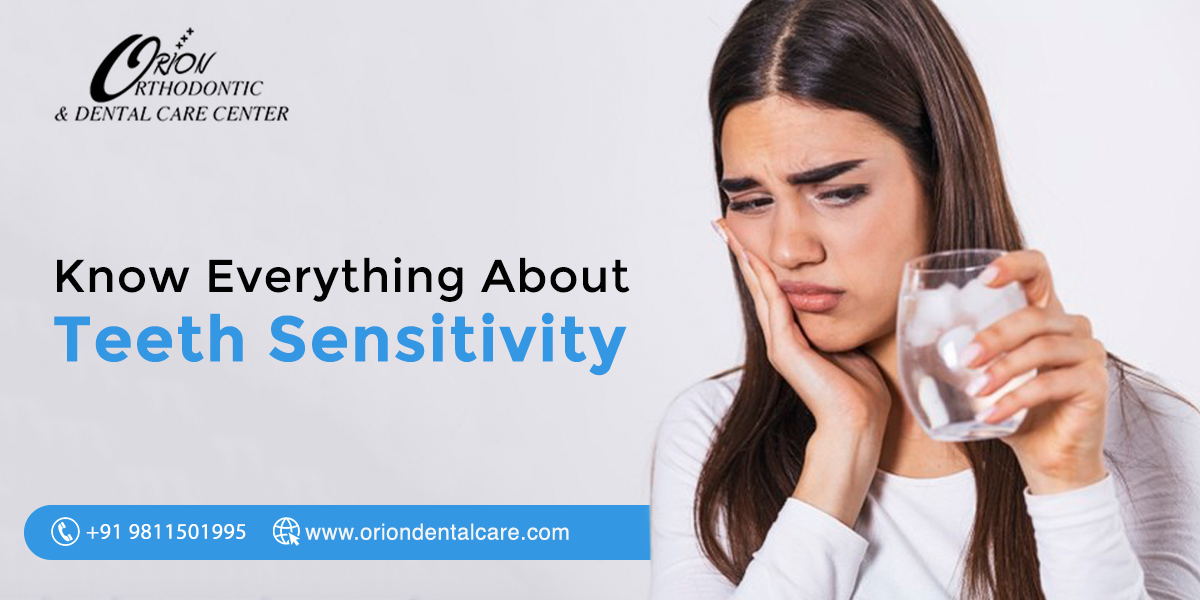While most people are aware that teeth must be kept clean and cared about, not many know the value of caring for their gums, especially when it comes to preventing pyorrhoea gum disease/ pyria treatment. Gums are an important part of oral hygiene. Since pain in gums are vital for your oral health, if you’re neglecting them, you’re really at risk for oral health issues.
Since they support teeth, it becomes essential to look after signs such as bleeding gums.
Pyorrhea disease is basically a gum diseases that are a result of poor oral hygiene leading to tooth and gum decay and ultimately, bleeding of gums. Bleeding gums during brushing teeth or eating are the first signs of pyria. It can be due to irregular brushing of teeth which leads to accumulation of plaque and therefore, bacterial growth in and around your gums.
What is Pyria Disease?
Pyria is a severe gum infection that damages the soft tissue and bone that support the teeth. If left untreated, it often results in tooth loss. The disease involves inflammation of the gums, pockets forming between the teeth Aand gums, and eventually destruction of bone and connective tissue.
Pyria, also known as periodontitis or periodontal disease, is a common dental disease characterized by inflammation of the gums, which can damage the supporting structures of the teeth.
Effectively managing pyorrhea involves a combination of professional dental care, specified specifics, and a commitment to maintain optimal oral hygiene. Beforehand discovery and visionary treatment can help the progression of pyorrhea and save long-term oral health. However, consult with a dental professional for substantiated advice and treatment, if you suspect symptoms of pyorrhea.
What are the Causes of Pyria and Gum Diseases?
Gingivitis, also known as gum disease or pyria treatment, is when the soft gum tissue around your teeth becomes red and swollen. The most common reason for Pyorrhea disease or gum diseases is the collection of plaque around teeth. Bleeding
Gums are usually caused by this harmful plaque. The plaque is home to millions of bacteria that accumulate at or around the gum line. This leads to gingivitis, a mild form of gum diseases.
Gingivitis is characterized by gum inflammation and bleeding. It can be controlled with treatment and improved oral hygiene. If left ignored, bleeding gums and gingivitis can turn into a more serious form of gum diseases called periodontitis. In periodontitis, the inner layer of gum and teeth pull away to form gaps between them. These gaps or spaces collect plaque that gives rise to bacterial growth. While it may not be visible easily, the infection starts spreading below the gum line.
Look for the Best orthodontist in Delhi to know more about such causes.
Here some cause for Pyria and Gum Diseases:-
- Poor Oral Hygiene: The primary cause of Pyorrhea disease is inadequate oral hygiene practices. When you don’t brush and floss regularly, plaque, a sticky film of bacteria, builds up on your teeth. Over time, this plaque hardens into tartar, which can only be removed by a dentist or dental hygienist.
- Smoking and Tobacco Use: Smoking and using tobacco products not only stain your teeth but also significantly increase the risk of developing gum diseases, including Pyria.
- Diet and Nutrition: A diet lacking in essential nutrients, especially vitamin C, can weaken the gums’ ability to resist infection.
- Genetic Predisposition: Some individuals may be genetically predisposed to gum disease, making them more susceptible to Pyria.
- Certain Medical Conditions: Conditions such as diabetes, certain medications, and hormonal changes in women (especially during pregnancy and menopause) can increase the risk of developing Pyorrhea disease.
Pyria Symptoms
There are certain warning signs for pyria treatment or gum diseases that must be taken seriously if one were to avoid further damage to their oral health.
Here are a few early pyria symptoms –
- Easy bleeding of gums while brushing teeth or eating food
- Weak or moving teeth
- Bad breath
- Inflamed or red gums
- Formation of gap or spaces between teeth and gums
- If you notice such symptoms, visit the nearest dentist in Delhi who can help you prevent any further
- damage to your teeth and gums.
Bleeding gums or pyria can also be caused by the following factors –
- Poor oral hygiene such as not brushing teeth or flossing that leads to the formation of plaque
- Lifestyle habits such as smoking causing irreversible damage to the teeth
- Hereditary factors like a family history of dental issues
- Increased sensitivity of gums for gum diseases due to hormonal changes during
- menstruation, pregnancy, menopause, puberty, etc.
- Diseases such as diabetes increase the chances of gum diseases
Also Read:- How Does Invisalign Work? | How Much Does Invisalign Cost in India?
Pyria Treatment
While pyria and bleeding gums can be irritating and scary, there are ways to mitigate these by improving your overall oral health. This will help eliminate bleeding gums in a long time. Remember that bleeding gums occur mostly due to the accumulation of plaque on the teeth or around the gum line.
Therefore, the first step is maintaining good oral hygiene. Below are a few ways that can lead to healthy teeth and gums and help prevent or reduce gum bleeding:
- Regular Brushing: Use a good quality, soft-bristle toothbrush and brush in a circular motion twice a day to stimulate your gums, prevent bleeding gums and strengthen your teeth.
- Replace your brush: Ideally, change your toothbrush once every two months as the bristles can wear off as well as bacteria can accumulate on the brush.
- Flossing: Along with brushing, flossing is equally important to help prevent bleeding gums and maintain good oral health. It helps get rid of plaque and food particles that may be hiding under the gum line.
- Good lifestyle habits: Avoid using tobacco as it can damage your gums, and also increase chances of gum diseases. Try to minimize or avoid coffee as it stains your teeth and damages your gums.
- Adopt healthy lifestyle habits: Following a balanced diet and avoiding food and beverages that stick to your teeth and damage them. Also, a regular workout can reduce stress and help control gum diseases.
- Regular check-ups: Visit your dentist regularly if you notice symptoms such as swollen gums, bleeding gums, weak or moving teeth, etc. Your dentist can do periodical cleaning of your teeth that can remove plaque and tartar from teeth and gums. This can reduce the bleeding of gums and keep your mouth healthy. Early treatment of signs such as bleeding gums can help prevent serious gum diseases later.
Also Read this:- Sensitive Teeth: Causes, Symptoms, Remedies & Treatment
While one can follow healthy lifestyle habits along with dental treatment to control gum bleeding and Pyria, it is important to do so timely. Otherwise, the decay goes beyond the point of repair and teeth cannot be treated easily.
Pyria treatment or bleeding gums basically focuses on the removal of plaque, reducing swelling or redness of gums, promoting reattachment of healthy gums to teeth; minimizing the risk of infection; and stopping the progression of gum diseases. The type of treatment that dentists may suggest will depend on the stage of gum diseases, the spread of bacterial infection and your oral health.
It may be simple cleaning of plaque from your teeth or in some cases the surgery may be required
To reattach the gums to the healthy.
The key is to not wait for warning signs and start with good oral hygiene habits right away. Ideally,
- brush twice a day for around 3 minutes to clean your teeth properly. You must brush over the gum-
- line and floss once or twice every day. Make sure to move the brush over your teeth as well as gums.
- To know the health condition of your teeth and gums better, visit the best dentist in Delhi today. If you have early signs of pyria, contact here for consultation with the best dentist in Delhi.
Understanding Other Most Common Dental Problems
Maintaining good oral health is essential for overall well-being. Here are some of the most common dental problems that individuals often encounter:
Tooth Decay (Cavities)
Tooth decay, or cavities, occurs when bacteria in the mouth produce acids that erode the enamel. This can lead to the formation of small holes in the teeth, causing pain and sensitivity.
Gum Disease (Periodontal Disease)
Gum disease is an infection of the tissues supporting the teeth. It ranges from gingivitis (mild gum inflammation) to periodontitis (severe infection). Symptoms include swollen, red gums, bleeding, and bad breath.
Bad Breath (Halitosis)
Persistent bad breath can result from poor oral hygiene, gum disease, dry mouth, or certain medical conditions. Regular brushing, flossing, and dental check-ups can help address bad breath.
Tooth Sensitivity
Tooth sensitivity involves discomfort or pain when consuming hot, cold, sweet, or acidic foods and drinks. It can be caused by tooth decay, worn enamel, or exposed tooth roots.
Tooth Erosion
Tooth erosion is the gradual wearing away of the enamel, often due to acidic foods and drinks. It can lead to tooth sensitivity and discoloration.
Oral Cancer
Oral cancer can affect the lips, tongue, cheeks, and throat. Regular dental check-ups can aid in early detection, improving the chances of successful treatment.
Most Common Dental Problems Their Treatment And Precautions
| Dental Problem | Treatment | Precautions |
| Tooth Decay (Cavities) | Dental fillings, root canal treatment, dental crowns | – Practice good oral hygiene to prevent further decay. |
| – Limit sugary food and drinks. | ||
| – Attend regular dental check-ups. | ||
| Gingivitis | Professional dental cleaning, improved oral hygiene | – Brush and floss regularly. |
| – Use an antimicrobial mouthwash. | ||
| – Schedule routine dental cleanings. | ||
| Periodontitis | Scaling and root planing, antibiotics, surgery | – Maintain excellent oral hygiene. |
| – Quit smoking to improve gum health. | ||
| – Follow post-surgery care instructions. | ||
| Tooth Sensitivity | Desensitizing toothpaste, fluoride treatments | – Avoid acidic foods and drinks. |
| – Use a soft-bristled toothbrush. | ||
| – Inform your dentist about sensitivity concerns. | ||
| Missing Teeth | Dental implants, Dental bridges | – Follow proper oral hygiene for prosthetic care. |
| – Attend regular follow-up appointments. | ||
| – Avoid biting hard objects to prevent damage. | ||
| Malocclusion | Braces, Invisalign | – Adhere to orthodontic treatment guidelines. |
| – Attend regular adjustment appointments. | ||
| Oral Infections (Abscess) | Drainage root canal treatment | – Complete the full course of prescribed antibiotics. |
| – Follow post-treatment care instructions. | ||
| – Maintain good oral hygiene. | ||
| Bruxism (Teeth Grinding) | Mouthguards, stress management techniques | – Wear a custom-fitted night guard as prescribed. |
| – Manage stress through relaxation techniques. | ||
| Dry Mouth (Xerostomia) | Saliva substitutes, medications to stimulate saliva | – Stay hydrated by drinking water regularly. |
| – Limit caffeine and alcohol intake. | ||
| – Chew sugar-free gum to stimulate saliva production. | ||
| Impacted Wisdom Teeth | Extraction of impacted wisdom teeth | – Follow post-extraction care instructions. |
| – Attend follow-up appointments for monitoring. | ||
| Cracked or Fractured Teeth | Dental bonding, dental crowns, root canal therapy | – Avoid chewing hard objects or ice. |
| – Report any discomfort or changes to your dentist. |
Remember, individual cases may vary, and it’s essential to consult with a dentist for personalized advice and treatment plans.
FAQs
Which vitamin deficiency causes Pyria?
Pyria can be associated with vitamin C deficiency. Adequate vitamin C is crucial for maintaining healthy gums and preventing gum diseases.
What are the reasons for Pyria?
There are several reasons for Pyria some of them are poor oral hygiene, Smoking, Diabetes, Hormonal changes (as in pregnancy), Genetic predisposition, Weakened immune system and other.
At what age does Pyria occur?
Pyria can affect individuals of any age, but it tends to be more common in adults. Aging, along with accumulated risk factors, increases the likelihood of developing gum disease.
Check Out Our Latest Blogs




